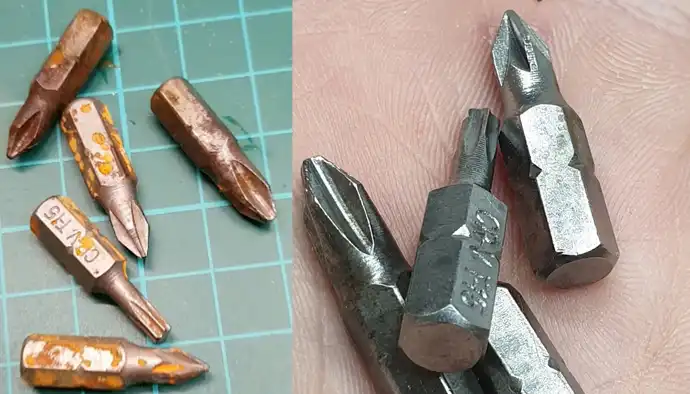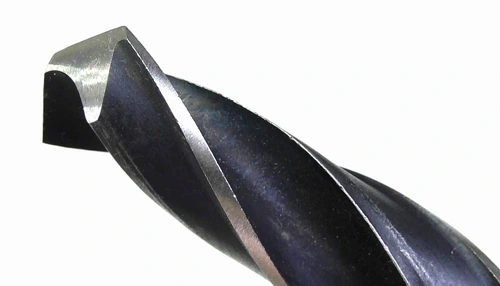Last Updated on July 5, 2022
If you have ever wondered how to keep drill bits from rusting, you are not alone. In fact, many homeowners struggle with this problem. There are a number of solutions to prevent your drill bits from rusting, from special coatings to regular cleaning.
The first thing to do if your drill bit is starting to rust is to soak it in white vinegar. This is an excellent rust remover.
Alternatively, you can dip your drill bit into WD-40 or other coatings before putting it in a dry bowl. However, this method is not effective if the bit is already rusted. This solution can also cause the bit to rust faster.
WD-40
WD-40 has been used for many years for drill bit lubrication. Its key technology is the Blu Torch, a proprietary blend of metal working fluids and surfactants that provides fast-acting penetration.
As a result, it can prevent drill bit rusting by 50%. You can use it on drill bits and other metal tools, as well as on untreated metal doors and hinges.
While lubricating drills is an essential step, it is important to prevent chafing, overheating, and corrosion. Sometimes, your drill may become stuck in the chuck or a small fragment gets caught in the chuck.
If this happens, WD-40 Specialist White Lithium Grease can solve the problem. Simply apply the grease directly on the affected area and the drill will start to run smoothly again.
Another use of WD-40 is rustproofing metal. It protects metal from rusting by acting as a barrier. If you are drilling holes in metal, it can help to apply WD-40 to the bit. The oil also prevents drill bits from rusting and corroding when applied to metal. However, WD-40 may not be effective in preventing drill bit rusting.
If the rust is too severe, you can apply WD-40 to the rusty area. The oil can be left to work overnight, or you can manually apply the substance as needed.
If the rust is light and only oxidized, you can scrub the bit with a wire brush or a sander. If the rust is severe, a grinding wheel can be used to remove it quickly and effectively.
Zirconium nitride
A hard, crystalline metal with excellent corrosion resistance, titanium can prevent drill bits from rusting. Its high heat and fatigue limits make it one of the most durable drill bit coatings, and can increase the life of drill bits by five to ten times.
Titanium is an extremely durable alloy that cuts a wide range of materials and is ideal for drill bits that need to be highly resistant to corrosion.
Although titanium is a better option, tungsten carbide is still preferred for a number of reasons. Carbon steel drill bits tend to rust. Titanium carbide drill bits, on the other hand, are a great choice for drilling carbon-fiber reinforced plastics.
Titanium carbide bits can be used on ferrous metals and aluminum alloys. Unlike titanium, zirconium nitride drill bits can last a lifetime when well-maintained.
Titanium carbide is a popular coating material because of its superior heat resistance. This type of coating also offers corrosion resistance in humid environments, making it useful for a variety of mechanical applications.
Titanium carbide is best suited for steel and iron, while zirconium nitride is good for magnesium and aluminum. This material is also useful in medical applications.
ZrN coatings have many useful properties. They exhibit high hardness and thermal stability, are biocompatible, and have an excellent resistance to wear, corrosion, and erosion.
They can also be used for electrical applications. So, if you need a drill bit that doesn’t rust, try ZrCr coating. You won’t regret it. You’ll thank yourself later.
Coatings
Drill bit coating is an added layer of protection that extends the lifespan of your bit by preventing rusting. It is often used to drill holes in specific materials such as stainless steel and other thick metals.
Some coatings reduce friction and increase resistance to heat, extending the life of drill bits up to five times longer than non-coated ones. Other coatings may help protect against corrosion and help the drill bit cut through a wide range of materials.
The most basic type of coating is black oxide. This coating increases heat resistance, lubrication, and protects against water damage, rust, and corrosion. Other coatings, such as titanium nitride, can improve heat resistance and reduce friction during drilling.
Some coatings even increase hardness and increase temperature resistance. Titanium aluminum nitride (TiAIN) is another type of coating, designed to increase hardness and resistance to heat.
To protect drill bits from rust, you can use non-oxidizing oils. Motor oil and WD-40 work well for some applications, but they can attract dust and are difficult to clean.
Paste wax is another option. Although it is not as effective, it can be used to prevent drill bits from rusting. When applied correctly, non-oxidizing oils can protect your drill bits for a lifetime.
Another option for preventing drill bits from rusting is vapor-corrosion inhibitors. These water-based products electrochemically bond to metal surfaces, protecting them from corrosion.
This type of coating can be applied to any metal surface and is non-polluting. They can penetrate into nooks and crannies and can protect tools from rust. If you don’t want to use a coating, you can still use a drill without it.
Geometry
One of the easiest ways to prevent rusting of drill bits is to clean them regularly. Drill bits can be easily cleaned by soaking them in a solution of water and vinegar for at least 30 minutes.
A scrubbing pad can be used to remove rust and corrosion. Baking soda also works as a good rust remover. You can also mix it with vinegar to form a paste. After applying this mixture, brush the drill bits with a cloth.
While choosing drill bits, make sure you consider the geometry, material, and coating. Each manufacturer will have their own proprietary configurations. The thickness of a drill bit is only one of the important factors; the geometry is equally important.
Thin drill bits are easier to snap than thick ones. The coating also makes a difference. To prevent rust from attacking the drill bit, keep them oiled. In addition, avoid storing them in a damp place or in a plastic bag.
To remove rust, you can soak your drill bits in white vinegar. After several hours, you can wash it off with detergent water. The baking soda paste will also remove any rust from your bits.
In addition, it will prevent the wood from decaying. So, if you are using drill bits frequently, make sure to maintain them as often as possible. If you are not careful, you may find your drilling equipment rusting sooner than you think.
While drilling, keep the bits clean. Rusted drill bits aren’t as sharp as you might have hoped. Proper care can extend their useful lives.
By following these simple tips, you can prolong the lifespan of your drill bits. And they will be easier to access if you are careful. You can also clean the drill bit by using a cloth dipped in oil. However, this technique will wear out quickly after repeated use.
Material
One way to keep your drill bits from rusting is to regularly clean them. By doing so, you will extend their life. It is also possible to keep them lubricated and free from moisture.
Here are some tips to keep your drill bits looking new and shiny. Using oil dipped cloths will prevent air and water from getting into your drill bits. However, this method is not recommended for heavy users, since paint will wear off after several uses.
Titanium is another great material for drill bits. While zirconium is not commonly used in drill bits, it increases steel strength and decreases friction. This makes titanium an excellent drill bit coating.
This material is also effective on various surfaces, including soft metals and hardwood. Therefore, it is worth the investment. Its low price makes it an economical option for many companies. However, you should always check the manufacturer’s warranty before you buy a drill bit.
Titanium-coated drill bits can withstand high temperatures and are therefore preferred for hard materials such as steel. Despite their price, titanium drills outlast their counterparts by more than 20 times.
However, the drawback to titanium drills is that their coating can lose its effectiveness over time. You should also make sure that you remove drill bits from deep holes frequently to allow the lubricant to reach the point. If you’re using large drills, lubricants are a good idea.
Cobalt-coated drill bits are also available. These drill bits contain five to eight percent cobalt. They have high hardness, and will not rust even when coated.
They can also be sharpened without losing their strength. These bits have a distinct gold color, and they are a better choice for drilling stainless steel. They are also the best for drilling stainless steel. The coating on cobalt drill bits will last a long time.
Frequently Asked Questions (FAQs)
1. How do you prevent drill bits from rusting?
The best way to prevent drill bits from rusting is to store them in a dry, airtight container. If they are stored in a humid environment, they should be wiped down with a dry cloth before being stored.
2. What are some of the best ways to prevent drill bits from rusting?
Some of the best ways to prevent drill bits from rusting are to store them in a dry place, to oil them regularly, and to avoid using them in humid environments.
3. What are some common causes of drill bits rusting?
Some common causes of drill bits rusting are storing them in humid environments, not drying them after use, and not oiling them regularly.
4. How can you tell if your drill bits are starting to rust?
If your drill bits are starting to rust, you may notice them becoming duller or harder to use. You can also try using a magnet to test if they are rusting – if the magnet doesn’t stick, this means that the metal is starting to corrode.
5. How do you clean drill bits that have already started to rust?
If the drill bits have already started to rust, you can try cleaning them with a wire brush or sandpaper. If the rust is severe, you may need to replace the drill bits.
Verdict
There are several ways to prevent drill bits from rusting. One is to keep them clean and dry. Another is to apply a light coat of oil or wax to the surface. Finally, store them in a dry, airtight container.




